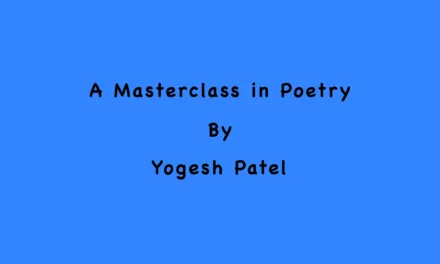PARALLELS
GET IT FROM THE OTHER WORLDS
Authors: Saravanan Kuppusamy & Sai R Anand
Published by Notion Press & Amazon
Genre: Scientific Thriller / Multiverse Fiction
Reviewer: R.Thilagam, PhD

In the expanding galaxy of contemporary science fiction, few debut novels make an impression strong enough to linger in the reader’s mind long after the last page. Parallels, a multiverse thriller by Saravanan Kuppusamy and Sai Anand, not only captivates with its high-concept premise but also delivers a narrative that’s cerebral, cinematic, and richly immersive.
At first glance, Parallels presents itself as a sci-fi tale in the tradition of time travel and theoretical physics. But as the chapters unfold, it reveals something deeper: a philosophical and existential inquiry woven through fast-paced action, historical intrigue, and speculative science. It is no surprise then, that readers have compared the experience of reading Parallels to the likes of Aldous Huxley’s Brave New World and George Orwell’s 1984. Indeed, while Kuppusamy and Anand don’t mimic the dystopian solemnity of those classics, they channel a similar spirit of intellectual daring and narrative invention.
The story follows David, an archaeologist whose discoveries do not merely unearth the past—they fracture it. When David stumbles upon an ancient artifact hidden deep beneath a stone structure, he is drawn into a whirlwind of events that defy both time and reason. As portals to alternate timelines open, the laws of nature begin to distort, and David realises he’s not simply discovering history—he’s rewriting it. The character of David is a welcome departure from the stereotypical sci-fi hero. He is thoughtful, conflicted, and deeply human—qualities that ground the novel’s far-reaching ideas in relatable emotional terrain.
The suspense and thrill in Parallels are lingering to the end. The narrative structure is masterfully crafted; each chapter builds on the last like a puzzle piece revealing a broader cosmic picture. Twists are never gratuitous; instead, they arise organically from the logic of the plot. There are moments where one feels a shiver of revelation, as ideas from physics, metaphysics, and ancient cultures converge in astonishing harmony. The vivid style of storytelling flows like a stream under a bridge without a break—graceful, consistent, and quietly powerful.
One of the most striking aspects of Parallels is its refusal to simplify. The authors do not shy away from complex scientific concepts—quantum entanglement, temporal loops, higher dimensions—and yet, through crisp prose and well-paced exposition, they make them accessible. This achievement is reminiscent of the best of Arthur C. Clarke or Neal Stephenson, where science and story are not at odds but in mutual service of meaning.
And Parallels is nothing if not meaningful. Beneath its thrilling plot lies a tapestry of themes: memory and identity, fate and freedom, the burden of knowledge, and the fragile thread of reality. The characters grapple with these themes not in abstract monologues, but through action, emotion, and consequence. A sequence where David faces an alternate version of himself is especially poignant—it is not simply a science-fiction device, but a mirror held up to the reader, reflecting on how each choice alters the universe within and without.
The book is also deeply rooted in cultural memory. There are moments where Eastern philosophy intersects with Western scientific theory, offering a hybrid worldview that feels fresh and important. This cross-cultural narrative lens makes Parallels not only globally relevant but spiritually resonant. Kuppusamy and Anand, both hailing from a rich literary and philosophical background, bring with them not only a knowledge of craft but a sense of ancestral depth and modern vision.
As a common reader I would say: “It is so good to read this book. I appreciate the authors Saravanan Kuppusamy and Sai Anand and congratulate them for their maiden success in sci-fi writing. The suspense and thrill are lingering to the end and the vivid style of the story is very good and flows like a stream under a bridge without a break. I felt the same thrill when I read Brave New World by Aldous Huxley or 1984 by George Orwell. I foresee many more books to be authored by them and wish them good luck and success.”
For a debut, the quality of Parallels is remarkable. The narrative voice is assured, the pacing is tight, and the themes are ambitious. There is an unmistakable cinematic quality to the prose, likely reflecting the authors’ involvement in film writing and visual storytelling. It would not be surprising to see this book adapted for screen, given its blend of spectacle and substance.
However, the novel is not without its minor flaws. At times, the dialogue dips into exposition, revealing the mechanics of the plot rather than letting them emerge naturally. A few characters could have benefited from deeper psychological development. Yet, these are forgivable in light of the novel’s scope and daring.
As the UK continues to celebrate diverse literary voices and speculative fiction that stretches the imagination, Parallels arrives as both a welcome addition and a bold statement. It is a novel that respects the intelligence of its reader while daring to dream beyond the boundaries of genre. It bridges the scientific and the spiritual, the personal and the cosmic, the seen and the unseen.
In closing, Parallels is more than a book—it’s a leap into the unknown, guided by two storytellers who are just beginning their journey. For readers who crave stories that challenge, transport, and transform, this is an unmissable read.






